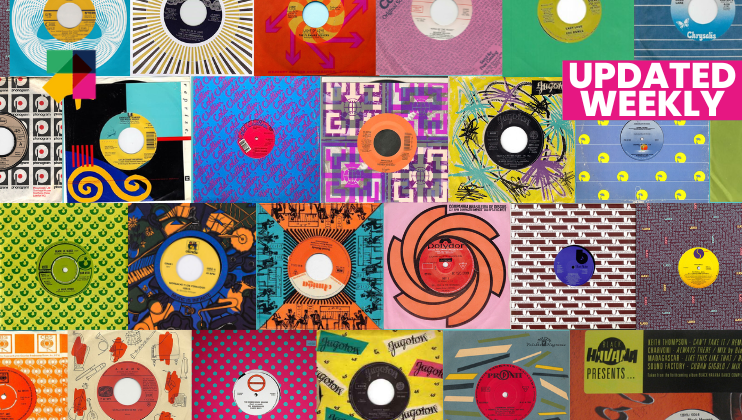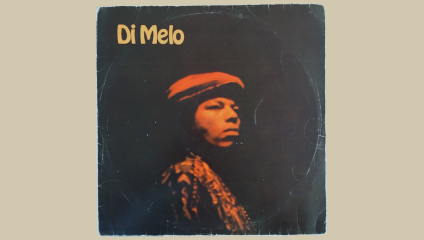Top 5 Albums of the Week
Culture Calling's Top 5 albums of the week, an eclectic mix of records from across genres and decades. Come discover weekly albums to bulk out your collection.

Di Melo – s/t (1975)

Just on the break of disco, in the stream of funk and soul, Di Melo anticipated the burgeoning traits of 80s dance music, much like the other funk talents of his day. A style much more in line with New Jersey and Ohio than his native Pernambuco, Di Melo bought the swagger, the irony, the swing to American-style funk, with witty, wise, sometimes tragic, lyrics, addictive vocal melodies, and pulsating, shoulder-shaking instrumentation that earns him a spot amongst the greatest of the decade, even though his self-titled was the only album of it.
‘A Vida Em Seus Metodoz Diz Calma’, the albums stand-out and most well-known, was gleefully revived in a stellar rework by our favourite Aroop Roy, highlighting for us again the tracks aptitude at making you drop all your possessions and jump gleefully around, to the chorus of “calma, calma, calma, calma, calma”, translated as – ironically – “calm down” (x5).
Drawing upon the great Brazilian musical tradition of juxtaposing and contrasting, Di Melo makes a case to keep your calm attitude in a musical field of mayhem, to hold it down and keep it inside while blurting uncontrollably. He does this again on the albums other highlight, ‘Se O Mundo Acabasse Em Mel’, telling a tale of the end of the world, ending in honey, exploring the sweetness and sadness of endings, or callously treating the end of the world with irreverence. Even if you can’t understand Portuguese, when he drops another one-line chorus of “Mel” (x4), you can hear the conflict and sadness in his voice, even with its excitement. What an outstanding talent this man is.
Fairport Convention – Unhalfbricking (1969)

One of Britain’s best exports in the 60s folk revival, Unhalfbricking tries to represent almost every face of folk, blues, and country within a forty-minute window. Once dubbed ‘the British Jefferson Airplane’, their setlists were dominated by Joni Mitchell and Bob Dylan, before on Unhalfbricking they decided to turn more toward traditional British music, but still with the Dylan covers.
While Thompson and Hutchings deserve their credit for the beautiful instrumentation, the real star of the show is Sandy Denny, who at just 21 held so much wisdom, soul, experience, and insight to pen probably the greatest British folk song of the era: ‘Who Knows Where The Time Goes?’. How could it be that someone who was barely drinking age in America could speak so directly and emotively about the cruel passage of time? It is as if she had lived a few lifetimes already. Absolutely astounding work.
Shabazz Palaces – Lese Majesty (2014)

The project of former Digable Planets member Ishmael Butler aka Butterfly, Shabazz Palaces became notable for being the first hip-hop group to sign to the Sub-Pop label. However, one could argue that they are barely hip-hop, only being deemed so because of its vocals. The project could easily be labelled avant-garde, experimental, electronica, ambient, or just a new thing entirely, Shabazzcore if you will.
Twinkling, moody, bassy, isolating, sometimes scary, Lese Majesty drops you in the wilderness with nothing more than a pair of trackies and some twisted leaf, leaving you bopping your head while escaping a pack of wolves. A24 should look to Shabazz for their next horror movie score.
For a while compared to Death Grips for their spooky alternative hip-hop sound, the comparison now feels dated; they were simply both ahead of their time at the same time. While both create a powerful sense of dread, Shabazz does it underhandedly, creating awkward and uncomfortable spaces between stabs of melody, employing a much slower BPM than is expected in any genre of electronic music, dragging out the dismay and gorging on the emptiness it creates.
The rapping style of Butler is here unrecognisable from his Digable days, now closer to spoken word, shedding the superfluities of rhythm. His voice becomes another instrument of horror, here to emphasise the terroristic beats and not to draw any overt attention. The only track that contains anything resembling a traditional verse is ‘Forerunner Foray’, a track whose instrumentation snarls like a slouching beast in the night. Almost a decade later, it still sounds cutting edge, even after waves of similarly atmospheric cloudrap and vaporwave.
Professor Creepshow – Cyber Eclipse (2023)

Championing a sound self-described as ‘playawave’, Prof. Creepshow effortlessly combines hip-hop with vaporwave, like if DJ Screw had a Soundcloud. Mostly sample-based, with old funk and soul tracks pitch-shifted, looped, chopped, and screwed, with new drums and accoutrements sprinkled over top, Cyber Eclipse, is structured like a classic hip-hop instrumental record, with tracks rarely exceeding 150 seconds in length, plunging you into an immersive auditory landscape before ripping you clean out and plunging you into another one.
Something I’ve heard from this album that I haven’t heard so far; early 2010’s nostalgia. Not only does it evoke the same 80s/90s saudade that vaporwave was essentially invented to evoke, but now that vaporwave has celebrated its tenth birthday, Cyber Eclipse too evokes that chillwave era of 2010, which for much younger audiences might as well be the 90s to them. A double dose of nostalgia makes for a serious injection, big-boy amounts of melancholic longing.
Misha Panfilov – Atlantico (2023)

Ethereal, moody, and contemplative, Estonian multi-instrumentalist Misha Panfilov artfully combines soul jazz, ambient, bossa nova, and psychedelia into a dizzying yet cohesive sonic world.
Something of a soundtrack to an off-kilter journey through the doors of perception, Panfilov’s brand of psychedelia aims to take you out of the moment without over stimulating.
If anything, the subdued and dampened drums and softened melodic instruments make it hard for any particular element to stand out, culminating in a deeply satisfying, solid wall of sound.